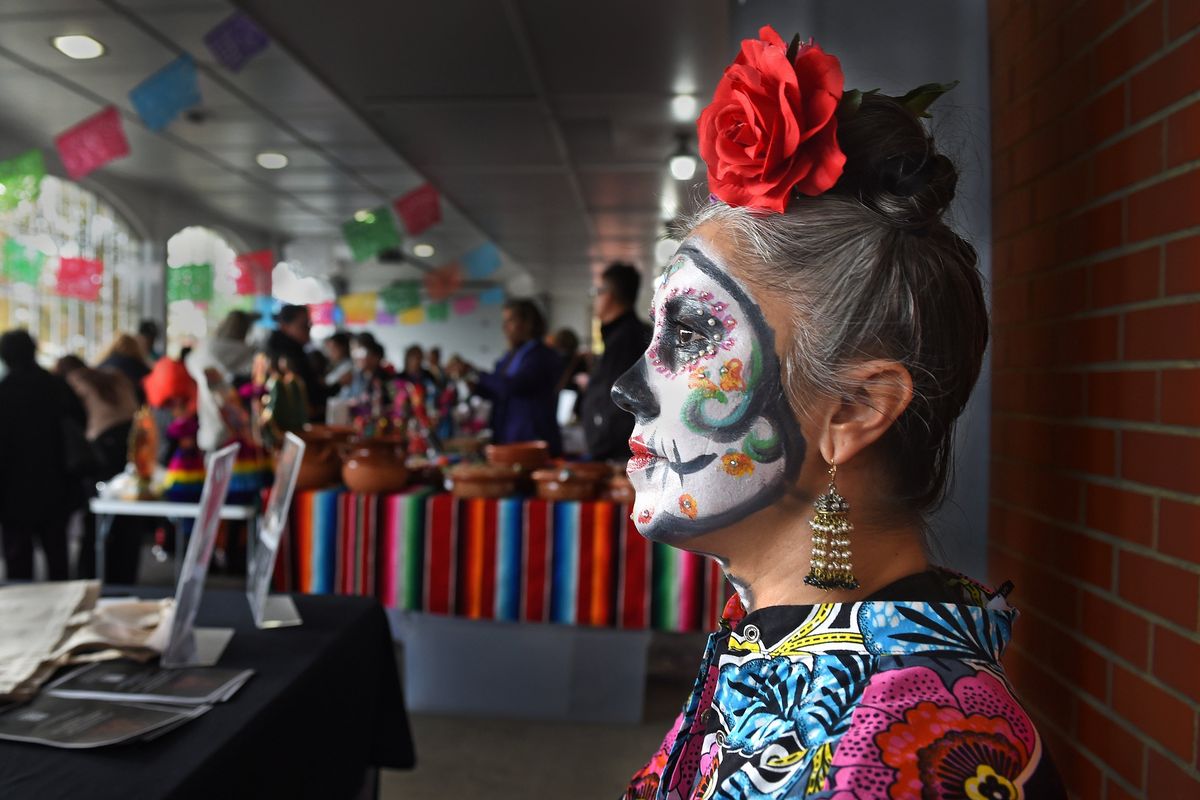A celebration of life: Spokane Valley funeral home hosts eighth Dia de los Muertos celebration

Candles lit the way for the spirits of loved ones who have passed to find their altars, or ofrendas.
A dozen musicians from Mariachi Las Aguilas, an Eastern Washington University music group, belted out traditional Mexican folk music. Children swung at piñatas in the parking lot.
Standing several feet high, the ofrendas were adorned in bright orange cempasuchil, commonly known as the marigold flower in the U.S., as well as photographs of the deceased and their favorite things: candy, bottles of beer and tequila, cigarettes, fruits, beans, tamales and sweet bread, known as pan de muerto.
“You’re basically putting out the feast for your loved ones,” said Spokane Valley resident Israel Wright during the eighth annual celebration of Dia de los Muertos at the Hazen & Jaeger Valley Funeral Home on Sunday. “It’s definitely not something you’re going to be sad about.”
Every family celebrates the holiday a little differently Wright said. His family, for instance, does not include alcohol or tobacco products on the ofrendas.
The Dia de los Muertos celebration at Hazen & Jaeger Valley Funeral Home in Spokane Valley is the eighth of its kind hosted by the Dignity Memorial, which operates the Hazen & Jaeger Valley Funeral Home and several funeral homes in Eastern Washington. The funeral home first partnered with the Hispanic Business and Professionals Association in 2015 in an effort to reach out to the growing Hispanic community in Spokane. The event has attracted hundreds each year, general manager Scott Dahl said.
Participation took a dip in 2020 during the COVID lockdowns, but those numbers are climbing back up, said Larry Valadez, vice president of the Hispanic Business and Professional Association Foundation.
Dia de los Muertos originated in Mexico as a mixture of Aztec tradition that honored the dead and Catholic tradition brought to Mexico by the Spaniards. The church rejected the Indigenous beliefs and instead introduced All Saints’ Day and All Souls’ Day, celebrated Nov. 1 and 2, respectively, since the Middle Ages. The people of Mexico turned those observances into the vibrant celebration known as Dia de los Muertos.
The two-day celebration will have kicked off at 12:01 a.m. on Tuesday with a celebration of deceased children, or Dia de los Angelitos. Dia de los Difuntos kicks off Wednesday and culminates with a public celebration, including parades and live music in some Mexican cities.
In her hometown of Morelia, Mexico, Lupe Mejia said her family and others often celebrate by cleaning and decorating graves and sharing their favorite memories of their loved ones. In the United States, though, she doesn’t typically observe the holiday.
“The cemeteries are lit at night,” she said of her hometown while crafting a flower made of tissue paper at the funeral home celebration. “It’s more to remember your family and show appreciation for culture and ancestors.”
Brandi McLeod, who grew up among Mexican culture, said she hopes to make the celebration a regular tradition in the future. Her sister died this August, she said.
“I don’t think you realize it until someone passes away,” she said. “You’re celebrating their life.”
While the holiday is often closely associated with Halloween in the United States because of the timing of the year and the skulls (or calaveras), the two holidays don’t share much else in common. Despite the name, Dia de los Muertos is a festive celebration of life that honors those who have died during the time of year that the land of the living and land of the dead are believed to be closest.
“It’s not a somber occasion in anyway,” Valadez said. “We have music and food and the whole family is involved.”
That is also what appealed to Dahl at the funeral home.
“Our thought was to get a nonfuneral celebration with no caskets there, but basically a party, then subsequently it would help people become more comfortable being inside of a funeral home,” he said. “We’re sort of transitioning from a stereotypical funeral celebration to a celebration of life. People like the concept of that.”